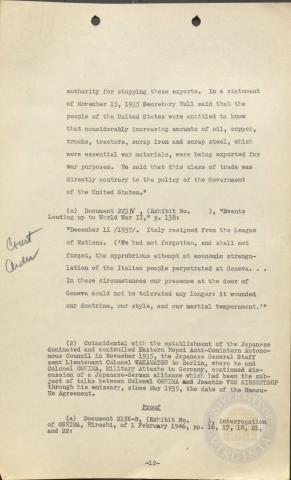
Page 12
| Parent | Collaboration Between Japan, Germany and Italy - Volume II |
|---|---|
| Date | 25 November 1941 |
| Language | English |
| Collection | Tavenner Papers & IMTFE Official Records |
| Box | Box 15 |
| Folder | Japan, Germany, Italy Collaboration Vol 2 |
| Repository | University of Virginia Law Library |
authority for stopping these exports. In a statement of November 15, 1935 Secretary Hull said that the people of the United States were entitled to know that considerably increasing amounts of oil, copper, trucks, tractors, scrap iron and scrap steel, which were essential war materials, were being exported for war purposes. He said that this class of trade was directly contrary to the policy of the Government of the United States.w
(c) Document 223 N » (Exhibit No. ), "Events Leading up to World War II,M p. 138:
"December 11 /1937A Italy resigned from the League of Nations. (fWe had not forgotten, and shall not forget, the opprobrious attempt at economic strangu¬lation of the Italian people perpetrated at Geneva. • . In these circumstances our presence at the door of Geneva could not be tolerated any longer* it wounded our doctrine, our style, and our martial temperament.1"
(2) Coincidental with the establishment of the Japanese dominated and controlled Eastern Hopei Anti-Comintern Autono¬mous Council in November 1935* the Japanese General Staff sent Lieutenant Colonel WAKAMATSU to Berlin, where he and Colonel OSHIMA, Military Attache to Germany, continued dis¬cussion of a Japanese-German alliance which had been the sub¬ject of talks between Colonel OSHIMA and Joachim VON RIBBENTROP through his emissary, since May 1935, the date of the Umezu- Ho Agreement.
Proof
(a)Document 2156-B, (Exhibit No. ), Interrogation of OSHIMA, Hiroshi, of 1 February 1946, pp. 16, 17, 18, 21, and 22i
